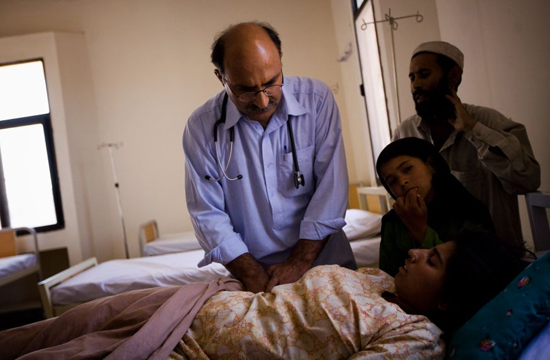As displaced people return home to the Swat Valley and Buner district in northern Pakistan, MSF is stepping up its support to local health care providers in Mardan and Lower Dir districts in response to a sharp increase in cases of acute diarrhea.

Pakistan 2009 © Marta Ramoneda
As displaced people return to their homes in the Swat Valley and Buner district, a rapid increase in cases of acute diarrhea is putting pressure on MSF health facilities
As displaced people return home to the Swat Valley and Buner district in northern Pakistan, Doctors Without Borders/Médecins Sans Frontières (MSF) is stepping up its support to local health care providers in Mardan and Lower Dir districts in response to a sharp increase in cases of acute diarrhea.
In the past three weeks, MSF medical teams have witnessed a sharp rise in cases of severe acute diarrhea, in a region where cholera is endemic
More than one million people fled the recent fighting between Pakistani military forces and Taliban combatants in the Swat Valley. They found refuge in the districts of Mardan, Charsadda, and Peshawar. Three months later, the population flow is gradually reversing. Temporary camps have shut down and a third of the displaced people have returned home with material and financial support from the Office of the United Nations High Commissioner for Refugees and the Pakistani government. Their departure has—to some degree—lessened the burden on local health centers such as Mardan University Medical Complex and the Takht Bhai rural health center, where MSF has had medical teams present to provide care for a massive influx of displaced people in recent months.
Despite the ongoing return of those displaced by the conflict, pressure has not entirely let up at the Mardan medical complex. More and more displaced people, as well as local residents, are coming in for medical treatment. In the past three weeks, MSF medical teams have witnessed a sharp rise in cases of severe acute diarrhea in a region where cholera is endemic. The World Health Organization has undertaken diagnostic tests, but has yet to release its findings.
In response to this upsurge of diarrhea cases, MSF has opened a temporary health facility in Mardan that will have a capacity of 100 beds as well as smaller health centers at Timurgara and Summerbagh hospitals in the Lower Dir district. “Within one month we have gone from 30 admissions in the first week, to 127 patients admitted last week,” reports Fabien Schneider, MSF’s head of mission in Pakistan.
Making matters worse, torrential rains beginning in mid-August caused flooding and displacing tens of thousands in Mardan and Swabi districts. MSF responded quickly to help 150 families in the most isolated areas who had been deprived of other assistance but is concerned over the overcrowding and worsened sanitation, which increase the risk of an epidemic.
Meanwhile, the security situation for the returnees remains volatile. Although the conditions have improved in urban centers in the Swat Valley, Lower Dir, and Buner, isolated areas are still threatened by persistent violence and families could be forced to flee once again.




